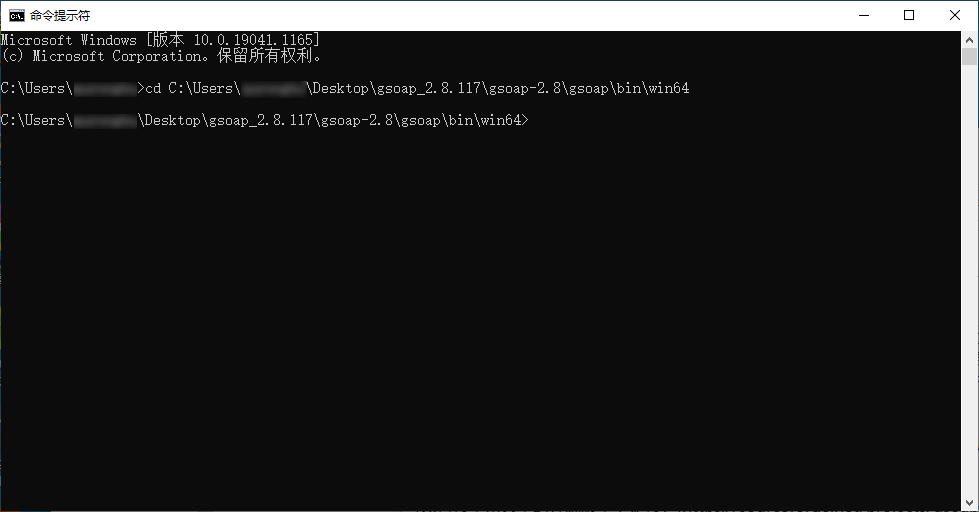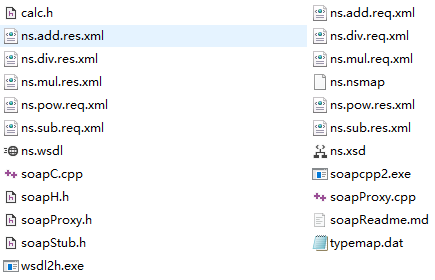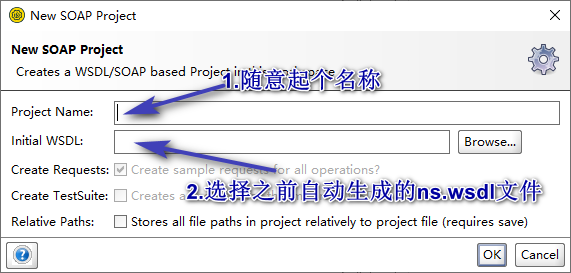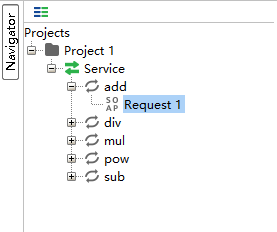本文主要介绍C++中gSOAP的使用方法,附带介绍SOAP协议的基础知识,适用于第一次使用gSOAP的开发人员。gSOAP官网上的示例代码存在一些错误,对初次接触的人不太友好,本文是在官方示例calc++的基础上进行了一些补充、改动。
SOAP简介
SOAP 是一种简单的基于 XML 的协议,它使应用程序通过 HTTP 来交换信息,具体内容可以参考SOAP 教程。SOAP的本质是通过HTTP协议以XML格式进行数据交互,只不过这个XML格式的定义是大家公认的。
使用SOAP时需注意,SOAP的XML命名空间由于版本的不同可能存在差异(如soapevn、SOAP-ENV),在调用SOAP服务前最好确认服务器的XML格式。
gSOAP
gSOAP 有商业版、开源版两个版本,开源版使用GPLv2开源协议,支持多个操作系统,具体内容参考github或者官网。
gSOAP提供了一组编译工具(可以认为是代码生成器)和一些库文件,简化C/C++语言开发web服务或客户端程序的工作,开发人员可以专注于实现应用程序的逻辑:
- 编译工具提供了一个SOAP/XML 关于C/C++ 语言的实现,能够自动完成本地C或C++数据类型和XML数据结构之间的转换。
- 库文件提供了SOAP报文生成、HTTP协议通讯的实现,及相关的配套设施,用于最终的SOAP报文的生成、传输。
本文使用的库文件主要是以下几个:
- stdsoap2.h、stdsoap2.cpp:HTTP协议的实现、最终的SOAP报文生成,如果是C语言则使用stdsoap2.h、stdsoap2.c
- typemap.dat: wsdl2h工具根据wsdl文件生成头文件时需要此文件,可以更改项目的xml命名空间(后面再细说)
- threads.h:实现高性能的多线程服务器需要的文件,可以并发处理请求,并且在服务操作变得耗时时不会阻塞其他客户端请求
准备工作
先进入官网的下载页面,然后选择开源版本:

也可以直接点击开源版本的官方下载链接或https://pan.baidu.com/s/156PEw9OMbzQel39Oozknow提取码: gy4x。
将下载的压缩包解压(本文使用的是gsoap_2.8.117.zip),解压后的文件放到自己习惯的位置(推荐放到C盘)。
在命令行提示符窗口中,使用cd命令进入..\gsoap_2.8.117\gsoap-2.8\gsoap\bin\win64目录:

注:后面需要把头文件、typemap.dat放到该程序目录下,生成的文件也在这里。
头文件
使用gSOAP的编译工具生成代码,需要一个定义API的头文件,此处使用官方示例中的calc.h头文件,对两个数字进行加、减、乘、除或乘方运算:。
calc.h头文件可以通过wsdl2h工具自动生成(需要Web 服务的 WSDL文件 ),运行的cmd命令如下:
wsdl2h -o calc.h http://www.genivia.com/calc.wsdl
也可以手动定义一个calc.h头文件,内容如下:
//gsoap ns service method add Sums two values int ns__add(double a, double b, double &result); //gsoap ns service method sub Subtracts two values int ns__sub(double a, double b, double &result); //gsoap ns service method mul Multiplies two values int ns__mul(double a, double b, double &result); //gsoap ns service method div Divides two values int ns__div(double a, double b, double &result); //gsoap ns service method pow Raises a to b int ns__pow(double a, double b, double &result);
构建客户端应用程序
客户端应用程序在命令行中运行并使用命令行参数调用计算器 Web 服务来对两个数字进行加、减、乘、除或乘方运算。
生成soap源码
为客户端生成服务和数据绑定接口:
soapcpp2 -j -r -CL calc.h
其中 option-j生成 C++ 代理类,option-r生成报告,option-CL仅生成客户端,而没有(未使用的)lib 文件。
这会生成以下几个文件:

其中,xml文件是SOAP报文的示例,便于后期的调试,以add方法为例。
add方法的请求报文ns.add.req.xml内容如下:
<?xml version="1.0" encoding="UTF-8"?> <SOAP-ENV:Envelope xmlns:SOAP-ENV="http://schemas.xmlsoap.org/soap/envelope/" xmlns:SOAP-ENC="http://schemas.xmlsoap.org/soap/encoding/" xmlns:xsi="http://www.w3.org/2001/XMLSchema-instance" xmlns:xsd="http://www.w3.org/2001/XMLSchema" xmlns:ns="http://tempuri.org/ns.xsd"> <SOAP-ENV:Body> <ns:add> <a>0.0</a> <b>0.0</b> </ns:add> </SOAP-ENV:Body> </SOAP-ENV:Envelope>
add方法的响应报文ns.add.req.xml内容如下:
<?xml version="1.0" encoding="UTF-8"?> <SOAP-ENV:Envelope xmlns:SOAP-ENV="http://schemas.xmlsoap.org/soap/envelope/" xmlns:SOAP-ENC="http://schemas.xmlsoap.org/soap/encoding/" xmlns:xsi="http://www.w3.org/2001/XMLSchema-instance" xmlns:xsd="http://www.w3.org/2001/XMLSchema" xmlns:ns="http://tempuri.org/ns.xsd"> <SOAP-ENV:Body> <ns:addResponse> <result>0.0</result> </ns:addResponse> </SOAP-ENV:Body> </SOAP-ENV:Envelope>
建立客户端项目
建立一个C++的控制台应用项目,引入上面生成的几个文件:
- soapStub.h: 没有注释的纯 C/C++ 头文件语法的规范副本。
- soapH.h:声明 XML 序列化程序。
- soapC.cpp: 实现 XML 序列化程序。
- soapProxy.h: 定义客户端 XML 服务 API 类Proxy。
- soapProxy.cpp: 实现客户端 XML 服务 API 类Proxy。
- calc.nsmap: XML 命名空间绑定表到 #include。
还需要引入gSOAP解压目录下的stdsoap2.h和stdsoap2.cpp文件。
为方便调试,客户端程序示例改为固定参数调用add方法,代码如下:
#include "soapProxy.h"
#include "ns.nsmap"
/* the Web service endpoint URL */
const char server[] = "http://localhost:8080";
int main(int argc, char** argv)
{
/*if (argc < 4)
{
fprintf(stderr, "Usage: [add|sub|mul|div|pow] num num\n");
exit(1);
}*/
Proxy calc(server);
double a, b, result;
/*a = strtod(argv[2], NULL);
b = strtod(argv[3], NULL);*/
a = 3;
b = 23;
/*switch (*argv[1])*/
switch ('a')
{
case 'a':
calc.add(a, b, result);
break;
case 's':
calc.sub(a, b, result);
break;
case 'm':
calc.mul(a, b, result);
break;
case 'd':
calc.div(a, b, result);
break;
case 'p':
calc.pow(a, b, result);
break;
default:
fprintf(stderr, "Unknown command\n");
exit(1);
}
if (calc.soap->error)
calc.soap_stream_fault(std::cerr);
else
std::cout << "result = " << result << std::endl;
calc.destroy(); /* clean up */
std::cout << std::endl;
return 0;
}
构建服务端应用程序
实现一个独立的迭代服务器,它接受主机端口上的传入请求,支持多线程,可以并发处理请求,并且在服务操作变得耗时时不会阻塞其他客户端请求。
生成SOAP源码
为服务器端生成服务和数据绑定接口:
soapcpp2 -j -r -SL calc.h
其中 option-j生成 C++ 服务类,option-r生成报告,option-SL仅生成服务器端,而没有(未使用的)lib 文件。
生成的文件和客户端的文件名称一样,只是内容不同。
建立服务端项目
建立一个C++的控制台应用项目,引入的生成文件和客户端的相同。为了支持多线程,需要引入文件threads.h。
服务端代码如下:
#include "soapService.h"
#include "ns.nsmap"
#include "threads.h"
int port = 8080;
void* process_request(void* arg)
{
Service* service = (Service*)arg;
THREAD_DETACH(THREAD_ID);
if (service)
{
service->serve();
service->destroy(); /* clean up */
delete service;
}
return NULL;
}
int main()
{
Service service(SOAP_IO_KEEPALIVE); /* enable HTTP kee-alive */
service.soap->send_timeout = service.soap->recv_timeout = 5; /* 5 sec socket idle timeout */
service.soap->transfer_timeout = 30; /* 30 sec message transfer timeout */
SOAP_SOCKET m = service.bind(NULL, port, 100); /* master socket */
if (soap_valid_socket(m))
{
while (soap_valid_socket(service.accept()))
{
THREAD_TYPE tid;
void* arg = (void*)service.copy();
/* use updated THREAD_CREATE from plugin/threads.h https://www.genivia.com/files/threads.zip */
if (arg)
while (THREAD_CREATE(&tid, (void* (*)(void*))process_request, arg))
Sleep(1);
}
}
service.soap_stream_fault(std::cerr);
service.destroy(); /* clean up */
return 0;
}
/* service operation function */
int Service::add(double a, double b, double& result)
{
result = a + b;
return SOAP_OK;
}
/* service operation function */
int Service::sub(double a, double b, double& result)
{
result = a - b;
return SOAP_OK;
}
/* service operation function */
int Service::mul(double a, double b, double& result)
{
result = a * b;
return SOAP_OK;
}
/* service operation function */
int Service::div(double a, double b, double& result)
{
if (b)
result = a / b;
else
return soap_senderfault("Division by zero", NULL);
return SOAP_OK;
}
/* service operation function */
int Service::pow(double a, double b, double& result)
{
result = ::pow(a, b);
if (soap_errno == EDOM) /* soap_errno is like errno, but portable */
return soap_senderfault("Power function domain error", NULL);
return SOAP_OK;
}
打印报文
在实际调试中,需要确定SOAP协议过程中具体的报文,只需要改动stdsoap2.cpp源码即可。参考gsoap报文打印,实现保存最后一次报文到特定的文件。
在stdsoap2.h头文件include下添加fstream,内容如下:
#include "stdsoap2.h" #include <fstream>
soap_begin_recv函数开始处添加以下代码:
//发送完请求报文 获取请求报文信息(作为客户端的时候)
std::string str_reqXml = "";
std::string strBuf;
std::string::size_type pos1 = std::string::npos;
std::string::size_type pos2 = std::string::npos;
strBuf = soap->buf;
pos1 = strBuf.find("<?xml", 0);
pos2 = strBuf.find("</SOAP-ENV:Envelope>", 0);
if (pos1 != std::string::npos && pos2 != std::string::npos)
{
str_reqXml = strBuf.substr(pos1, pos2 - pos1 + 20);
}
std::ofstream outfile;
outfile.open("reqXml.txt");
outfile << str_reqXml;
outfile.close();
soap_body_end_in函数开始处添加以下代码:
//接收完应答报文 获取应答报文信息(作为客户端的时候)
std::string str_resXml = "";
std::string strBuf;
std::string strEnd = "</SOAP-ENV:Envelope>";
std::string::size_type pos1 = std::string::npos;
std::string::size_type pos2 = std::string::npos;
pos1 = std::string::npos;
pos2 = std::string::npos;
soap->buf[SOAP_BUFLEN - 1] = '\0';
strBuf = soap->buf;
pos1 = strBuf.find("<?xml", 0);
pos2 = strBuf.find(strEnd, 0);
if (pos1 != std::string::npos && pos2 != std::string::npos)
{
str_resXml = strBuf.substr(pos1, pos2 - pos1 + strEnd.length());
}
std::ofstream outfile;
outfile.open("resXml.txt");
outfile << str_resXml;
outfile.close();
soap_recv_raw函数结尾处(return前)添加以下代码:
//请求报文(作为服务端的时候)
std::string req_data;
req_data.assign(soap->buf, ret);
std::ofstream outfile;
outfile.open("req_data.txt");
outfile << req_data;
outfile.close();
soap_flush_raw函数结尾处(return前)添加以下代码:
//应答报文(作为服务端的时候)
std::string res_data;
res_data.assign(s, n);
std::ofstream outfile;
outfile.open("res_data.txt");
outfile << res_data;
outfile.close();
注:客户端可以一直打印报文,服务端只能在Debug运行时才会打印报文,应该有其它方法可以解决。
SOAP测试
运行上面的服务器、客户端项目,可以看到运行API调用结果,也可以使用SoapUI进行测试。
进入官网的下载链接:https://www.soapui.org/downloads/soapui/,下载开源版本并安装。
打开软件,在菜单栏的“File”中选择“New SOAP Project”:

展开左侧的项目,双击“Request”,开始进行测试:


项目源码
总结
本篇文章就到这里了,希望能够给你带来帮助,也希望您能够多多关注服务器之家的更多内容!
原文链接:https://www.cnblogs.com/timefiles/p/CppGSoap.html
















